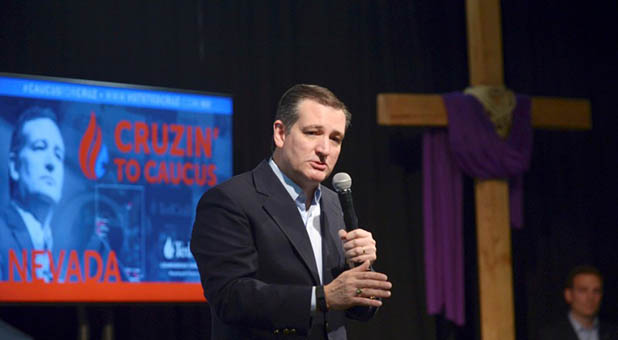The Nevada Entrance Data Explains How Evangelicals Voted
Donald Trump won a Republican presidential nominating contest for a third time in a row Tuesday night, singlehandedly raking in more votes than the combined total of all of the 2012 GOP candidates.
The final, albeit unofficial, vote tallies from the Nevada Republican Party show Trump had a nearly 2-to-1 advantage over Rubio. Here are the totals, along with projected delegate counts:
1. Donald Trump 34,531 14 delegates
2. Marco Rubio 17,940 7 delegates
3. Ted Cruz 16,079 6 delegates
4. Ben Carson 3,619 2 delegates
5. John Kasich 2,709 1 delegate
6. Rand Paul 170
7. Jeb Bush 64
8. Chris Christie 50
9. Carly Fiorina 22
10. Mike Huckabee 21
11. Rick Santorum 11
The entrance polling data shows how it happened. Evangelical voters turned out in record-breaking numbers and a plurality voted for the billionaire front-runner.
Traditionally, less than 10 percent of Nevada Republican Caucus attendees identify as born-again evangelicals. Tuesday night, that number swelled to 39 percent, but here’s how their vote was broken down:
1. Donald Trump 41 percent
2. Ted Cruz 26 percent
3. Marco Rubio 25 percent
4. Ben Carson 7 percent
5. John Kasich 2 percent
But although nearly 4 in 10 voters identified as evangelical Christians, only 3 in 10 voters said the top quality they were looking for in a candidate was one who shared their values. Here’s how their vote broke down:
1. Ted Cruz 42 percent
2. Marco Rubio 26 percent
3. Donald Trump 20 percent
4. Ben Carson 6 percent
5. John Kasich 5 percent
On the other hand, Trump won nearly all the support among the 20 percent of voters who said preferred a candidate who “tells it like it is”:
1. Donald Trump 86 percent
2. Ted Cruz 8 percent
3. Marco Rubio 4 percent
4. Ben Carson 2 percent
5. John Kasich 0 percent
Following the death of Supreme Court Associate Justice Antonin Scalia, Cruz had urged voters to make the 2016 election a “referendum” on the composition of the Supreme Court. He argued, as a former Supreme Court clerk and the former Texas Solicitor General, he was best equipped to make those decisions.
But based on entrance polling, Nevada voters disagreed. More than three-fourths of the voters agreed it was an important factor in their vote, with 18 percent saying it was the most important.
But among those who said it was one of a few important factors:
1. Donald Trump 47 percent
2. Ted Cruz 28 percent
3. Marco Rubio 21 percent
4. Ben Carson 3 percent
5. John Kasich 2 percent
And among those who said it was the most important factor:
1. Donald Trump 46 percent
2. Marco Rubio 27 percent
3. Ted Cruz 21 percent
4. Ben Carson 3 percent
5. John Kasich 3 percent
Helping to explain the record-shattering turnout: 97 percent of voters said they were either “dissatisfied” or “angry” about the federal government. Additionally, the entrance polling suggest two-thirds of voters were looking for a candidate outside the establishment.
Here’s how that vote broke down:
1. Donald Trump 71 percent
2. Ted Cruz 15 percent
3. Marco Rubio 8 percent
4. Ben Carson 5 percent
5. John Kasich 1 percent
Once again, these numbers are a disaster for those who hope to find a way to break Trump’s stranglehold on the GOP’s front-runner status. That puts a lot of pressure on the other candidates to expose weaknesses in Thursday night’s CNN debate in Houston, which happens to be Cruz’s hometown.
The window of opportunity is narrowing. The next round of voting is next Tuesday during the first-ever “SEC Primary,” also referred to by some as “Super Tuesday I.” That day, 12 states and more than half of the delegates needed to win the Republican presidential nomination will be at stake.
“One week from today will be the most important night of this campaign. One week from today is Super Tuesday,” Cruz said in his concession speech. “One week from today, the most delegates that are awarded on a single day will be awarded, next Tuesday. The role of the first four states is to narrow the field and give Super Tuesday a clear choice, and now the voters can decide.”
He again made the case that he was the only candidate who has, and can, beat Trump, based on his performance in Iowa. He also urged those who oppose Trump as a potential nominee to unite behind his campaign.
“If you are one of the 65 percent of Republicans across the country that doesn’t think Donald is the best candidate to go head to head with Hillary, who believes we do better in elections when we actually nominate a conservative, then the first four states have performed a vital function of narrowing this race and presenting a clear choice,” he said. “You can choose between two Washington deal makers, or one proven, consistent conservative.”
Even the most optimistic appraisals of Cruz’s prospects next week are pretty dim. According to Real Clear Politics, the Texas senator is leading in the polls—within the margin of error—in his home state and Arkansas. Trump is leading in all the other states.
In the next seven days, evangelicals who have rallied around the Cruz campaign are going to have to pray and convince supporters of other candidates why they should also rally to his cause.
















































